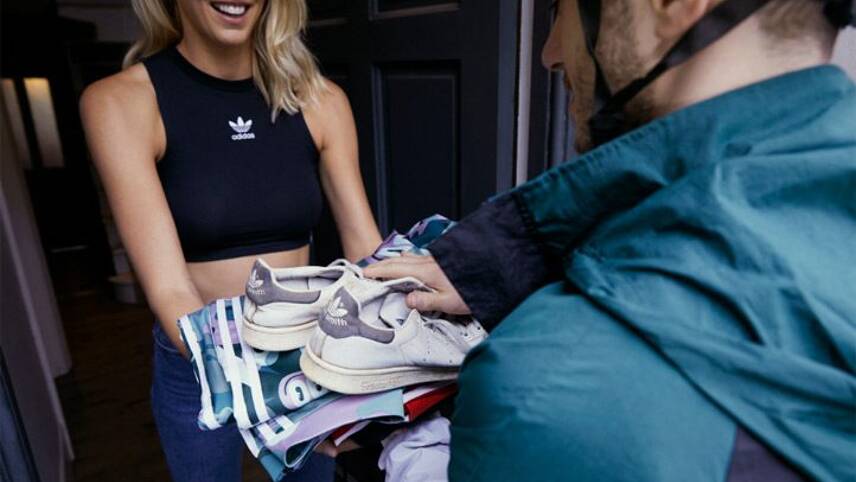Register for free and continue reading
Join our growing army of changemakers and get unlimited access to our premium content

Adidas of any condition will be accepted - but they have to have been purchased in the UK within the past five years. Image: LWARB
Called ‘Infinite Play’ and operated through a partnership with Stuffstr, the service lets UK-based consumers return any Adidas branded products purchased within the past five years to the brand in exchange for a gift card and loyalty club points.
In order to make a return, Infinite Play users should upload details regarding their items to the Adidas website or app. They will then be given the option to have the clothes, shoes and accessories collected from their home; to use Freepost to send them from their local post office.
Once Adidas receives the items, the user will receive a digital gift card to spend with the brand, equivalent to the estimated value of their goods. Adidas will accept items in any condition but each package sent must have a minimum estimated value of £20.
Stuffstr staff will then check and sort the items to identify where cleaning or repairs are needed before reselling them on behalf of Adidas. Items which are not able to be cleaned, repaired and resold will be sent for recycling using the “most innovative techniques available” to Adidas, which notably uses recycled content in 21 of its footwear lines.
“We want to re-think – and share responsibility for – the way in which we treat items once we’re finished with them,” Adidas said in a statement.
“Adidas gear was made to be played and replayed, time and time again. So, if you have trainers you barely wear, socks you wore too much, a track top that hugs or leggings that no longer do, don’t bin them or leave them at the back of your wardrobe. Release their value and pass [them] on to someone new. It’s better for them, for you, for future owners and the planet.”
Infinite Play will be promoted using a multimedia communications campaign, featuring videos, social media and emails as well as messaging on Adidas’s app and site.
A second life for sportswear
The move from Adidas comes shortly after it gave more than $1m in seed funding to Stuffstr – a start-up aiming to help all major retailers to offer take-back schemes where possible, in an aim to create a world where no items are wasted or underutilised. Stuffstr has helped Adidas to develop – and will help it to run – Infinite Play.
Elsewhere in its resource efficiency strategy, the sportswear giant is working to remove all virgin plastic components from its products and packaging by 2024. It is currently designing alternatives made using post-consumer recycled, pre-consumer recycled and compostable materials, including ocean plastics and mechanically recycled yarn.
Adidas’s ambitions in this space have come to the fore amid a rise in public and policy interest in the global fashion sector’s growing waste problem.
Currently, less than 1% of textiles recovered for recycling are turned into new garments, largely due to the difficulty of mechanically or chemically separating textile blends. At the same time, the global fashion industry is churning out more garments than ever before, with levels having surpassed 100 billion items per year in 2018, according to BBC documentary Stacey Dooley investigates fast fashion.
In a bid to solve this issue, businesses have historically turned to recycled content or attempted to change consumer behaviours by offering more detailed garment care advice. But now, a new wave of interest in business models such as rental, resale and repair is taking hold.
On resale specifically, Burberry recently signed a partnership to sell its second-hand products through consignment marketplace The RealReal in the US, while John Lewis Partnership and Farfetch have both launched buy-back schemes here in the UK.
Elsewhere, retailers including Selfridges and Asda have recently trialled their first in-store offerings for second-hand clothes as part of Oxfam’s #SecondHandSpetember campaign, which also saw the non-profit open its first charity ‘superstore’ in Oxford.
Nonetheless, fashion waste is predicted to cost the UK economy £4.48bn per year by 2030, according to research by MoneyBoat. This figure factors in the cost of waste management, as well as health impacts and environmental degradation.
Sarah George


Please login or Register to leave a comment.